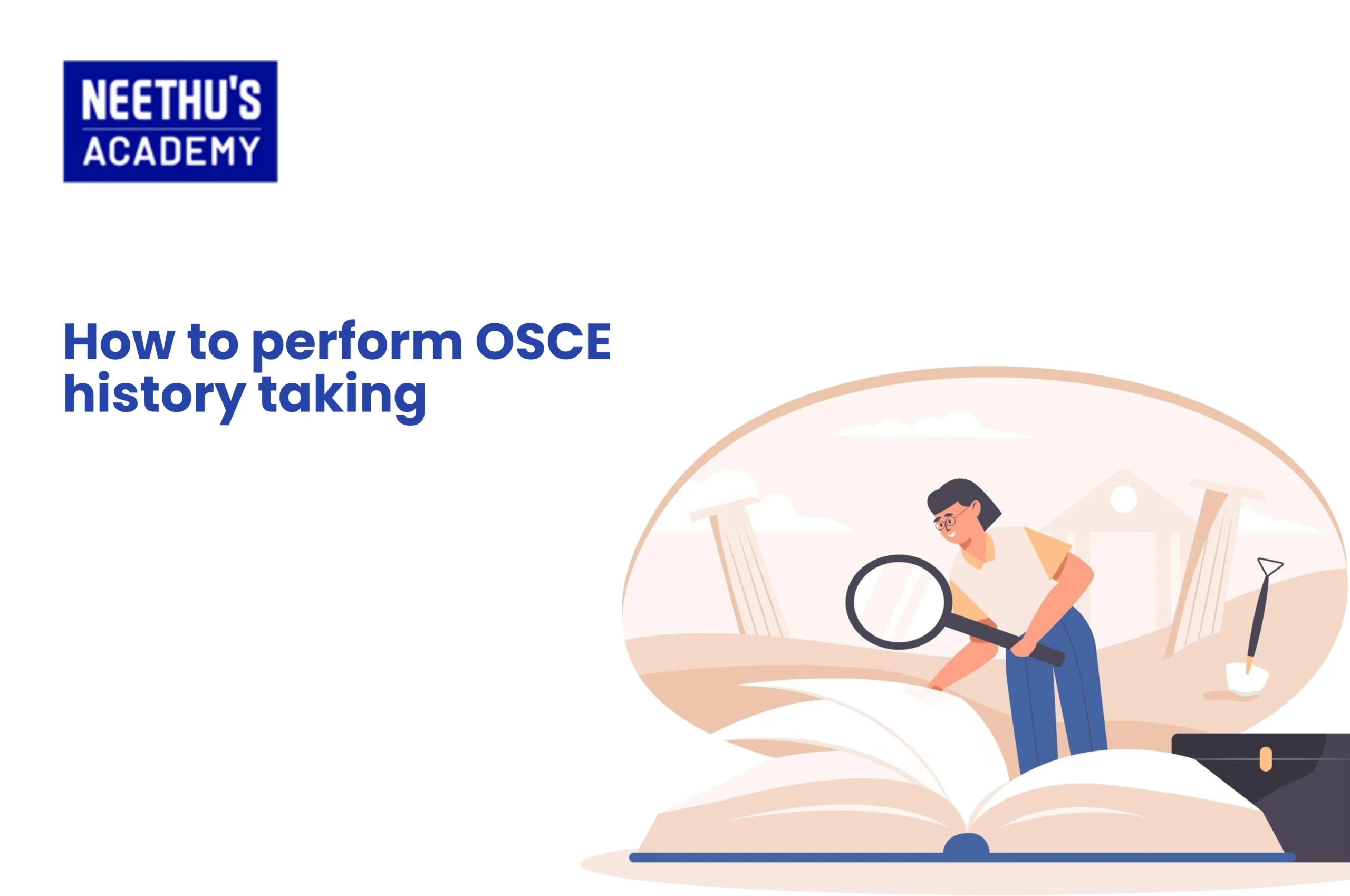OSCE is a critical assessment for healthcare professionals that tests not only the clinical knowledge but also the practical and communication skills…

How to Perform OSCE History Taking: Step-by-Step Guide for Success
Learning history taking is a core skill for any healthcare professional sitting OSCE clinical exams. In Objective Structured Clinical Examinations (OSCEs), taking patient history tends to be the foundation for diagnosis and management decisions. Whether you are a medical student, a nursing candidate, or a healthcare professional upgrading your qualifications, building strong OSCE clinical skills is crucial.
This blog will take you through the step-by-step on how to conduct OSCE history taking, give you key OSCE history tips, assist you with OSCE history practice, and offer you insights on how to take your preparation to the next level.
Understanding OSCE History Taking
The Objective Structured Clinical Examination (OSCE) is a practical test designed to evaluate real-world clinical competencies. Unlike written exams, OSCEs test your ability to interact with patients, gather relevant information, and make logical clinical decisions.
OSCE history taking evaluates your capacity to gather, arrange, and report the patient’s medical details in a systematic and empathetic manner. It analyses not just the facts you record, but also how you convey information, how you are organized, and how professionally you interact with the patient. Your OSCE history competencies are assessed together with interpersonal communication, empathy, time management, and reasoning skills — all of which are essential to delivering safe and effective care.
Step-by-Step Guide to OSCE History Taking
If you are not sure how to do OSCE history taking, a methodical approach is your best choice. Here’s one that works:
1. Preparation
- Read the station instructions carefully to get clues about the chief complaint.
- Mentally create a checklist: presenting complaint, history of presenting complaint, past medical history, medications, allergies, family and social history, systems review.
2. Introduction
- Smile at the patient and greet them warmly, keeping eye contact.
- Introduce yourself with your name and position (e.g., “I am a final-year medical student”).
- Verify the patient’s name and date of birth.
- Seek permission to continue — consent is required for OSCE stations.
3. Presenting Complaint (PC)
- Start with an open-ended question: “Can you tell me what brought you in today?”
- Allow the patient to describe without interruption at first.
4. History of Presenting Complaint (HPC)
Explore further using the SOCRATES acronym for pain or other symptom assessment:
- Site
- Onset
- Character
- Radiation
- Associated symptoms
- Timing
- Exacerbating/relieving factors
- Severity
5. Past Medical History (PMH)
- Ask about illnesses, hospital admissions, surgeries, and chronic conditions in the past.
- With women of childbearing age, remember to ask about the past obstetric history as well.
6. Medication History
- Inquire about prescription medications, over-the-counter medicines, herbal medications, and supplements.
- Make a note of any known allergies, particularly drug allergies.
7. Family History
Search for genetic vulnerabilities to illnesses such as diabetes, cardiovascular disease, cancer, and psychiatric illness.
8. Social History
Discuss smoking status, alcohol consumption, recreational drugs, occupation, marital status, and living situation.
9. Review of Systems
- Rapidly screen the other systems to reveal related symptoms.
- Customize this according to the presenting complaint (e.g., cardiovascular review for chest pain).
10. Summarizing and Closing
- Briefly summarize the patient’s history.
- Provide an opportunity for the patient to add anything.
- Thank the patient for their time.
Following this order of topics will enable you to deal with all significant points through your OSCE patient history sessions.
Tips for Successful OSCE History Taking
Enhancing your OSCE history taking is not about memorizing steps. These are some practical OSCE history tips:
- Focus on patient comfort: Use sympathetic words and non-threatening body positioning.
- Adjust to the patient: Slow down for older patients and be more sensitive to distressed patients.
- Be systematic but adaptable: If the patient discloses new information, alter the questioning rationally.
- Calm under pressure: Rehearse mock exams to mimic the live pressures of OSCEs.
- Watch your timing: Most OSCE stations last 5–10 minutes; plan your time accordingly.
- Keep findings in your head: As you go along, mentally construct a framework for your case presentation.
Avoiding Common Mistakes
Even good candidates can fall short on OSCE history taking. Steer clear of these traps:
- Not establishing rapport: Rushing straight to questions with no sincere greeting comes across as mechanical.
- Overwhelming the patient: Bombarding the patient with too many questions overwhelms the patient and breaks the rhythm.
- Avoiding open-ended questions: Starting with “yes/no” questions limits important patient histories.
- Poor closure: Not summarizing or asking if the patient has any concerns is a sign of poor communication.
- Ignoring emotional cues: Patients will sometimes nod towards emotional issues that must be dealt with.
Avoiding these errors refines both your OSCE clinical skills and your actual patient care proficiency.
Practice Situations for OSCE History Taking
Daily practice of OSCE history is crucial to build up confidence and proficiency. Try out these practice situations:
- Chest pain history: Explore features, risk factors, and differential diagnosis (MI, angina, anxiety).
- Abdominal pain history: Enquire about appendicitis, cholecystitis, and bowel obstruction based on localization.
- Shortness of breath: Differentiate between cardiac causes (heart failure) and respiratory causes (asthma, COPD).
- Psychiatric history: Conduct histories of depression, anxiety, or psychosis in a gentle, systematic fashion.
- Antenatal (Obstetric) history: Ask about past pregnancies, miscarriages, deliveries, and neonatal status.
- Working on varied cases not only proves useful for examinations but also enriches your later clinical practice.
Best OSCE Coaching Center in Kerala
Structured guidance can be the key to success. If you like a systematic and professional approach to preparation, joining an OSCE coaching center such as Neethu’s Academy is highly recommended. We offer:
- Trained instructors with clinical backgrounds
- Weekly mock OSCEs with constructive feedback
- Study guides focused on OSCE history skills
- Peer practice sessions
- Soft skills and communication workshops
Conclusion
To master OSCE history taking, you need a combination of structure, clinical thinking, communication, and empathy. By regular practice of OSCE history, OSCE clinical skill mastery, and avoiding pitfalls, you’ll be able to sit down at your exam station with confidence.
Whether you choose self-study or career guidance through an OSCE coaching center, always remember that success is crafted through hard work, reflective practice, and sincere passion.
Best of luck with your OSCE experience — and recall that each history you take is a narrative that has the potential to change lives!
Frequently Asked Questions
An OSCE examination is done by circulating candidates through timed stations where they carry out certain clinical tasks under observation.
Past obstetric history includes asking in a systematic manner about previous deliveries, miscarriages, complications, and neonatal outcomes.
The structure of history taking comprises presenting complaint, history of presenting complaint, past medical history, drug history, family history, social history, and systems review.
The most effective format for a history essay is one that has a compelling introduction, logically structured body paragraphs by theme or chronology, and a forceful, thoughtful conclusion.
Related Blogs
- All Posts
- OSCE
Mastering communication skills is a must for better performance in the OSCE. Effective communication in OSCEs helps in rapport building with patients,…
The OSCE or the Objective Structured Clinical Examination is, in fact, one of the most important assessments for doctors and other healthcare…
Course Enquiry
Latest Posts
- All Posts
- canada
- CBT
- DELF
- DHA
- French
- GENERAL
- German
- Haad
- IELTS
- IQN NEW ZEALAND
- LANGUAGECERT SELT
- MOH
- NCLEX-RN
- NHRA
- OET
- OSCE
- Pearson Vue
- PROMETRIC
- PTE
- TOEFL
- Back
- NCLEX - NGN
- Back
- OET FOR PHYSIOTHERAPIST
- OET FOR PHARMACIST
- OET FOR DOCTORS



